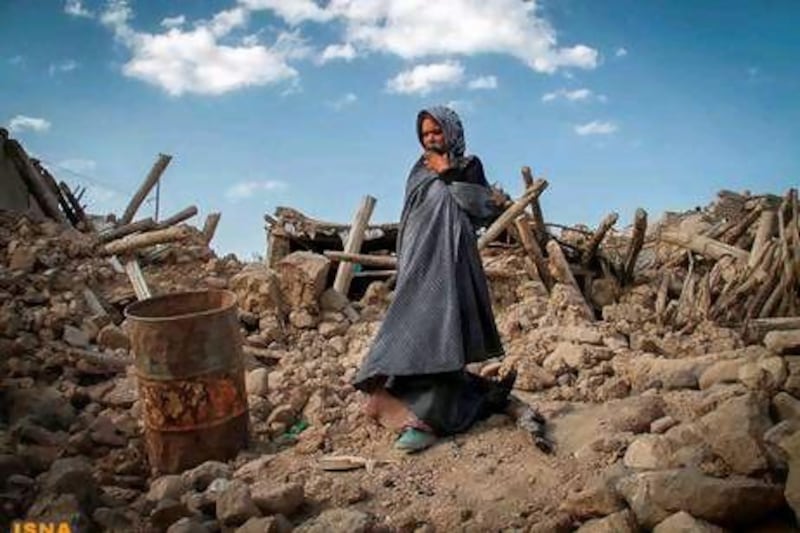TEHRAN // Two people were pulled out alive from rubble yesterday, three days after weekend quakes levelled villages in north-western Iran and well after authorities halted rescue operations.
The two were plucked from the smashed remains of their home after being detected by search dogs, state television and the official IRNA news agency reported.
The pair, both in good health, were saved in a village near the town of Varzaqan, north-east of the city of Tabriz.
The hamlet was one of hundreds flattened by Saturday's twin quakes, measuring 6.4 and 6.3 on the moment magnitude scale, which killed 306 people and injured 3,000, according to an official toll.
The pair were rescued two days after Moustafa Mohammad Najjar, the interior minister, and his aide in charge of disaster management, Hossein Ghadami, declared a halt to rescue operations.
The officials had said there were no more survivors to be found.
Separately, the Fars news agency reported that an unspecified number of bodies were recovered yesterday, including that of a 27-year-old woman in the village.
Another report, by Iran's Labour news agency, said hundreds of villages had suffered severe damage, raising fears that the number of dead could mount sharply as rescuers reach previously inaccessible areas.
However, officials dismissed the idea that the number of fatalities could rise significantly, and said the eventual figure might be lower than current estimates.
"Many figures are based on speculation and have not been documented," said Behram Samadi Rad, a provincial coroner. "We cannot give a precise figure for the number of dead but we believe it will be under 300."
In Tehran, Karaj and Qom, thousands visited clinics late into the night to donate blood, Press TV reported, including Iran's Olympic gold medal-winning weightlifter, Behdad Salimi.
"I truly feel terrible for the people of East Azerbaijan. I want to do what I can to help them. The most important thing is to donate blood because of the shortage," Salimi said.
Some officials and members of the Iranian public have criticised the official response to the earthquake, while others praised the rapid response of emergency services.
Iran's government and the Red Crescent initially rejected offers for international help, but yesterday the government changed its stance and said it would now welcome foreign aid - an indication that authorities are struggling to cope with the aftermath.
"The European Commission is therefore reviewing how it could provide support, notably to the Iranian Red Crescent Society, which is working in the disaster area," said David Sharrock, spokesman for the EU's humanitarian aid and crisis response commission.
It was not immediately clear what such aid could entail. But in past natural disasters, the EU and member states have provided search-and-rescue teams, equipment for detecting people trapped in rubble, field hospitals and other medical assistance, as well as food, clean water and shelter.
Qatar has sent a Boeing 747 plane carrying 80 tonnes of food, warm clothes, blankets and tents to the area.
Iran's ambassador in Doha, Abdollah Sohrabi, said Qatar had also ordered a medical team consisting of 40 doctors and nurses to be sent to Iran, but that Iran's Red Crescent rejected the offer, saying it had enough medical help on the ground.
Yesterday, a sharp aftershock registering 5.3 on the Richter scale rocked rural areas around Tabriz, Iranian scientists said. The aftershock was powerful enough to spark panic in Tabriz, with staff streaming out of offices, the Fars news agency reported.
* With additional reporting by Reuters





